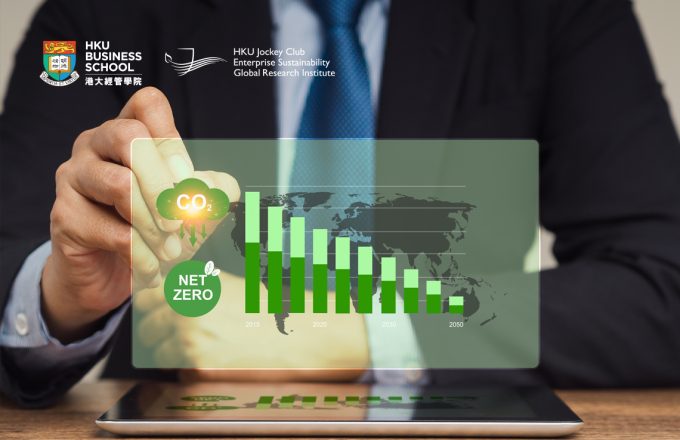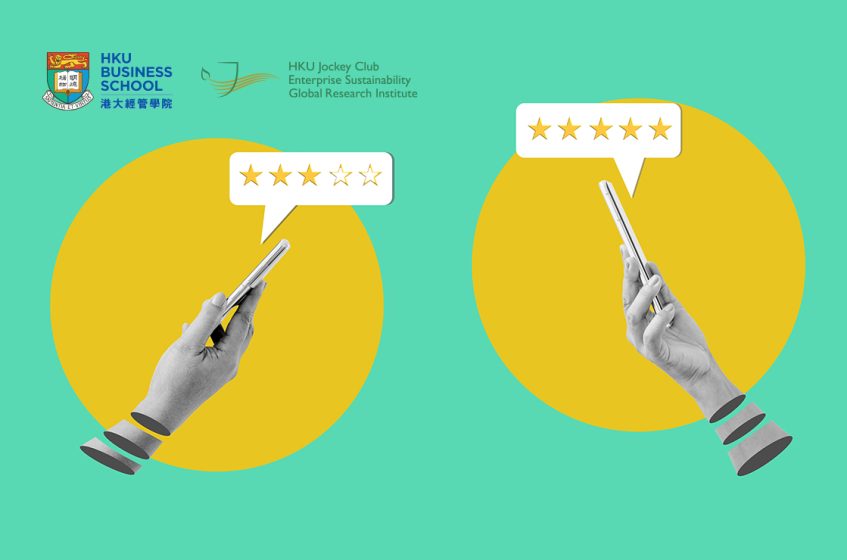
Soothing the unsatisfied or pleasing the satisfied? The effects of managerial responses to positive versus negative reviews on customer ratings and financial performance
- This study investigates the impact of managerial responses to positive and negative customer reviews (MR-P and MR-N) on subsequent review ratings and financial performance.
- The findings show more responses to positive reviews leads to an increase in subsequent customer review ratings and revenue, whereas more responses to negative reviews causes a short-term decrease in ratings and revenue but contributes to long-term improvements in these metrics.
- Lab experiments reveal management’s choice of review responses signals their stance on customer feedback, influencing future reviews: responding to positive reviews encourages positive feedback, whereas responding to negative reviews increases subsequent negative reviews from dissatisfied customers.
- However, for consumers without direct experience, managerial response to negative reviews has a mitigating effect.
- The influence of managerial responses on subsequent review ratings diminishes among firms whose responses contain highly similar content.
- When competitors actively engage with customer reviews, the effectiveness of a firm’s response strategy diminishes, prompting the need for businesses to adapt to maintain differentiation and competitive advantage.
Source Publication: Jiajun Wu, Jun Ye, Junhong Chu, Soothing the unsatisfied or pleasing the satisfied? The effects of managerial responses to positive versus negative reviews on customer ratings and financial performance, Journal of the Academy of Marketing Science, 2024.
Background and Research Questions.
Over the last decade, researchers and practitioners have become increasingly interested in how firms can leverage managerial responses (MRs) to capitalize on positive reviews and mitigate the potential harm caused by negative reviews. Intuitively, companies should respond to negative reviews (MR-N) to mitigate the damage they cause, while offering more general responses to positive reviews (MR-P). However, the proportion of MR-P on TripAdvisor has consistently increased since 2006 and has surpassed the percentage of MR-N since 2013. Two key questions remain: Given the constraints of limited resources, should managers prioritize soothing unsatisfied customers or pleasing satisfied ones? What are the effects of MRs on customer review ratings and financial outcomes?
Data and Method.
The study analyzes a massive dataset of hotel reviews and MRs collected from TripAdvisor and Expedia. The financial-performance data, specifically the revenue per available room, are from the Texas Comptroller’s Office database, spanning from August 2001 to December 2016. This dataset includes over 393,000 daily managerial responses to 804,000 daily online reviews, providing a rich source of data to explore the research questions.
The authors employ a cross-platform difference-in-differences (DID) approach to establish a strong causal link between MRs and subsequent review ratings. This method leverages the fact that whereas TripAdvisor allows hotels to respond to customer reviews, Expedia rarely does. The DID approach compares the changes in review ratings for the same hotels on both platforms, effectively controlling for factors that could influence both review ratings and MR decisions.
Figure 1. Effects of MR-P and MR-N on Subsequent Review Ratings
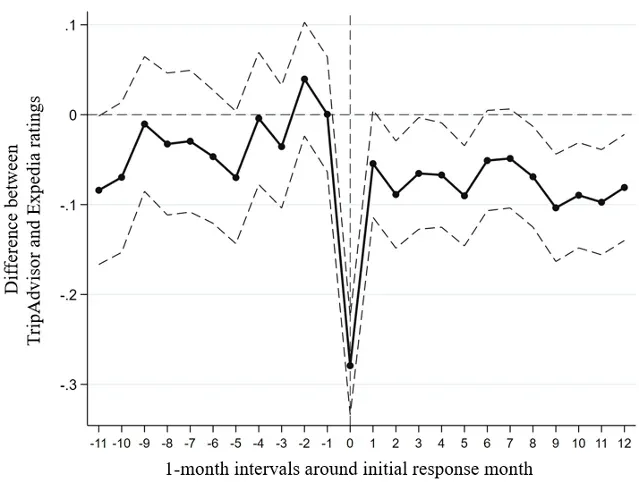
(a) Effects of MR-P and MR-N on subsequent review ratings
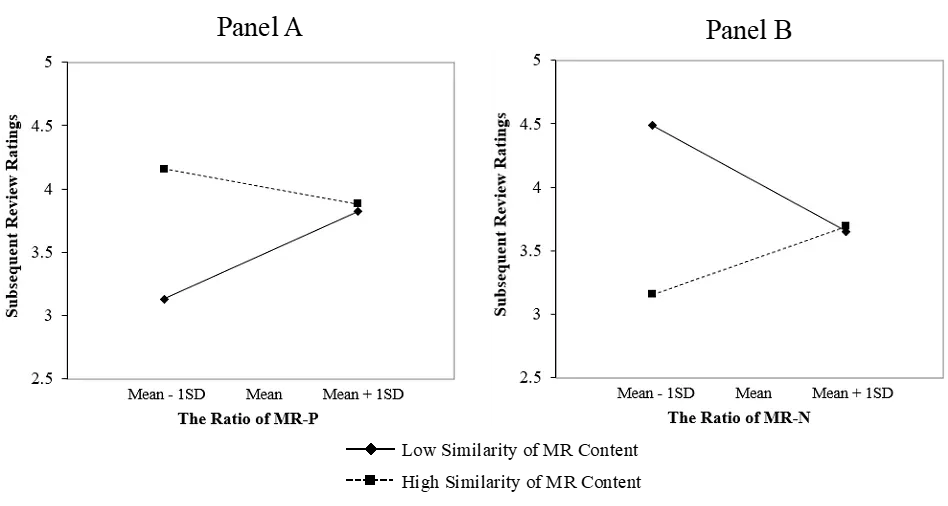
(b) Moderating effect of the similarity in the MR contents
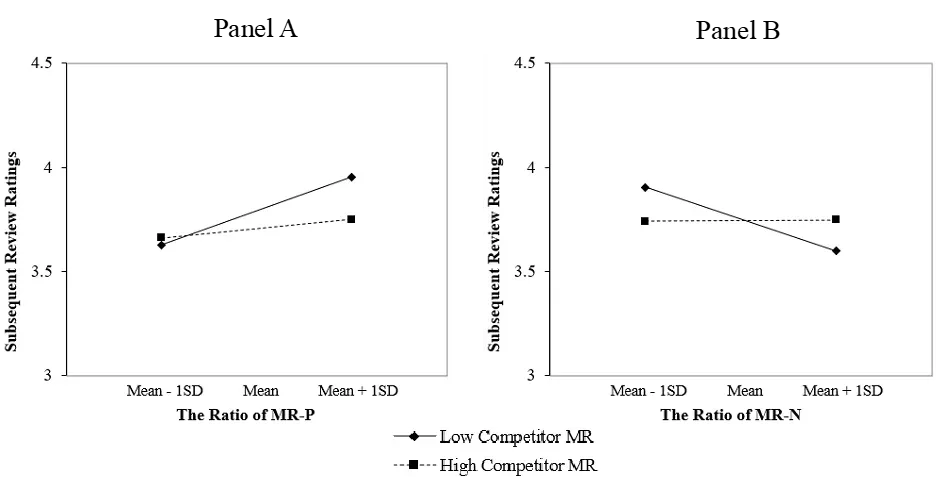
(c) Moderating effect of competitors’ managerial response ratio
The empirical evidence indicates the MR-P ratio positively affects subsequent review ratings and financial performance, suggesting managers prioritize pleasing satisfied customers. By contrast, the MR-N ratio has a short-term negative impact on review ratings and financial performance, but this effect diminishes over time and eventually becomes positive.
To explore the underlying psychological mechanisms—the signaling effect and the mitigating effect—Wu et al. (2024) conducted a series of laboratory experiments. The three lab studies show the MR-P ratio encourages more positive reviews, because customers are more likely to leave positive feedback when they see a high MR-P ratio. On the other hand, customers with negative experiences are more inclined to post negative reviews when observing a high MR-N ratio. However, for consumers who have not directly experienced the service and rely on reviews for their decisions, the MR-N ratio has a positive mitigating effect.
To further explore the contextual factors influencing firms’ MR decisions, the study examines MR content similarity and competitors’ MR engagement levels. The results indicate that when firms use similar text in their responses and when competitors increase their MR ratios, the impacts of MR ratios on review ratings and financial performance are weakened.
This study highlights the different impacts of MR-P and MR-N on crucial service quality and financial metrics. Managers should prioritize responses to positive reviews, due to their significant positive effects on future ratings and financial performance. For negative reviews, the authors recommend a “listen carefully but give standard responses” approach to capture value while minimizing negative signaling effects.
Customized responses to positive reviews are more effective and generate greater financial returns. For negative reviews, standardized responses are advisable to mitigate the short-term negative impact without excessive resource allocation.
Firms should adjust MR strategies based on competitor actions. When competitors have low engagement, firms can use MR as a point of differentiation. However, as competitor engagement increases, MR becomes a standard practice, reducing its differentiation effect.






